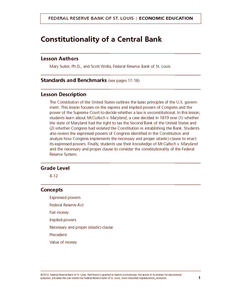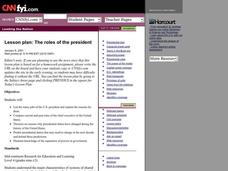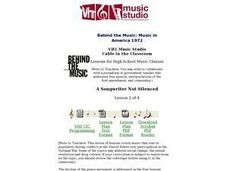Federal Reserve Bank
History of Money and Banking in the U.S.
Why was there a lack of confidence in the money and banking system of the early United States government? What historical events led to the establishment of the Federal Reserve System? Here you'll find reading materials and worksheets to...
Curated OER
Sectionalism in Early U.S.
Students, divided into three groups, representing the Northeastern, Southern, Western United States. They research these areas in early American history and as a group prepare charts, graphs and reports. They explain their needs and...
Museum of Tolerance
The Role of Citizens in a Participatory Democracy
Groups research participatory democracies and compare the role and rights of citizens in ancient history with those in recent U.S. history. Guided by a series of questions, individuals compose a persuasive essay in which they discuss the...
New York City Department of Education
Geography and Early Peoples of the Western Hemisphere
Young historians discover the early people of the western hemisphere. The unit explores how the land changed, how it was used and homes of early Americans such as Incas, Mayans, Inuits, Aztecs, and Pueblos. Individuals also examine these...
Curated OER
Government Policy and Its Impact on HIV/AIDS
Learners examine "President Bush's Emergency Plan for AIDS Relief", identify important U.S. policy events related to AIDS/HIV from the last 25 years and hold a policy debate on the funding for AIDS/HIV programs.
Center for Civic Education
Citizenship Schools and Civic Education During the Civil Rights Movement and in the Present
Your young historians will discover the importance that citizenship education has played in the social progress of the United States as they learn about early efforts to discourage African Americans from voting in the 1960s.
Curated OER
U.S. History: Virginia Assembly in America
Third graders discover the importance of the Virginia Assembly in English America as a governing body. After discussing the formation of the House of Burgesses, they elect their own representatives to make class decisions. In groups,...
Curated OER
Photography and the National Park Service
During the 1800s the United States was expanding westward; land was there for the taking. Kids explore how some early photographers used their photography to influenced the US Congress to save areas like Mirror Lake. They complete a...
National Endowment for the Humanities
Lesson 4 James Madison: Internal Improvements Balancing Act—Federal/State and Executive/Legislative
Who has the power? The founding fathers asked the same question when the United States was formed. Learners explore issues that arose during Madison’s presidency that raised constitutional questions. Through discovery, discussion, and...
Federal Reserve Bank
Constitutionality of a Central Bank
Considering the expressed and implied powers of Congress, was it constitutional for the United States to establish the Second National Bank in the early nineteenth century? What is the constitutionality of the Federal Reserve System?
Curated OER
The Declaration Versus The Communist Manifesto
Upper graders put their knowledge of the U.S. Constitution to the test when they are asked to mark which of several statements are from either the Constitution or the Communist Manifesto. A class discussion follows. Use this resource as...
Curated OER
National Security
Students discuss the Rosenberg spy case during the Cold War. They research and report on a recent or current investigation into espionage by people working for the U.S. government. Students find out what they can from newspapers,...
National Endowment for the Humanities
“Read All About It”: Primary Source Reading in “Chronicling America”
Can investigative journalism become too sensationalistic and accusatory, or is it vital for the survival of a democracy? Middle schoolers analyze primary source documents from early 20th-century newspapers as well as Theodore Roosevelt's...
Curated OER
New Citizen Exam is Democracy 101
Students read a USA Today article about U.S. democracy and then complete questions about the topic. In this democracy lesson, students read the article 'New Citizen Exam is Democracy 101.' Students learn about the test for U.S....
Curated OER
The Roles of the President
Young scholars list the many jobs of the U.S. president and explain the reasons for them. They compare current and past roles of the chief executive of the United States.
Curated OER
End of the Line: What Happened to the Blue Ridge Railroad?
Sixth graders study the westward expansion and the role of railroad construction to the expansion. In this railroad history lesson, 6th graders complete KWL activity for the topic. Students view a PowerPoint about the growth of railroads...
Alabama Department of Archives and History
Alabama's 1901 Constitution: What Was at Stake?
Who should be able to vote? As part of a study of the 1901 Alabama Constitution, class members examine primary source document that reveal the reasons the authors gave to support their positions on this question and their assumptions in...
National Endowment for the Humanities
Slavery and the American Founding: The "Inconsistency Not to Be Excused"
High schoolers examine slavery in the revolutionary and colonial eras of the United States. In this slavery lesson, students investigate the presence of slavery in early America, the language of the Constitution, and the intent of the...
NPR
Same-Sex Marriage
The battle over same-sex marriage is a prevalent issue in the United States, and a valuable topic to be discussed in your social studies classroom. Here is a basic outline of introductory questions, focus questions, vocabulary, and media...
Curated OER
A Songwriter Not Silenced - Lesson 2
Students discuss how a musician's message can influence society and government. They debate if political viewpoints should be publicized in music.
National Endowment for the Humanities
The House Un-American Activities Committee
Was the House Un-American Activities Committee justified in investigating subversive influences in the entertainment industry? Part two of the three-part series of lessons that examine the anti-communism movement after World War II,...
National Endowment for the Humanities
Soviet Espionage in America
The war against Communism and Joseph McCarthy’s place in it are the focus of a series of three lessons examining postwar America from 1945-1950. This first lesson asks groups to read an introduction that describes the Verona Project and...
Curated OER
Witch Hunt or Red Menace? Anticommunism in Postwar America, 1945-1954
High schoolers investigate the goals and methods of the House Un-American Activities Committee and offer an opinion regarding whether their investigation of Hollywood was justifiable.
Tennessee State Museum
An Emancipation Proclamation Map Lesson
Did the Emancipation Proclamation free all slaves during the Civil War? Why was it written, and what were its immediate and long-term effects? After reading primary source materials, constructing political maps representing information...

























